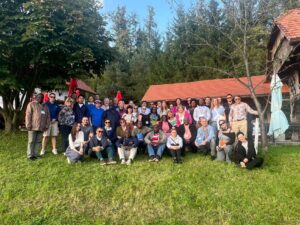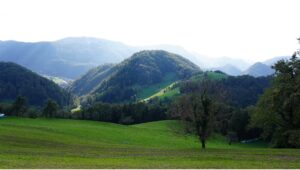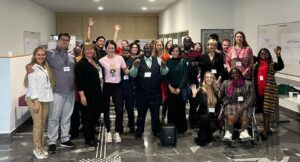In this month’s Director’s blog, I ruminate on the ‘special sauce’ of engaging with our networks and international collaborations and invite you to reflect and engage in developing insights and SIGs around these spaces of our work…
Following a vibrant IEEC in Belfast this year I had the privilege of visiting Slovenia, where I spent an intense, but wonderful week of ’sandpit’ activities as part for the Global Entrepreneurial Talent Management 4(GETM4) project that my home institution (Northumbria) leads as a UK Partner. The wider group of partner countries includes Slovenia, Ireland, Kenya, Chile,North Macedonia, Estonia, South Korea and Poland and the project gives researchers unparalleled opportunities to engage in international collaborations – frankly, it’s an absolute privilege to be part of it. The experience has inspired some reflections that I wanted to share in this blog. First, let me tell you a bit about the project and the ’sandpit’ activities I was involved in.
Global Entrepreneurial Talent Management 4 (GETM4) is an international, interdisciplinary, intergenerational and intersectorial research and innovation project funded by the EU’s Horizon Europe, UKRO, the South Korean Research Foundation and the Polish Education & Science Ministry . GETM4 offers secondment opportunities for university and industry staff and the project involves 8 work packages designed around developing insights into different aspects of Global Entrepreneurial Talent Management for different stakeholder groups, including entrepreneurs, HE institutions, industry and community. The overall aim is Researcher Development at all levels and themes include exploring entrepreneurial action and the effect of digital transformation on well-being, HE Innovation for Creative Confidence and Entrepreneurial Agency , Equality, Diversity, Accessibility & Inclusion, and Respectful Translation (to name just a few) which represents a number of themes very close to my heart – as I am sure is the case for many of you in the EEUK membership. However, it’s not just the nature of the foci in the project but the methodology – the format and the way it is done – that gives further room to pause and take stock, and I’ll come back to this shortly…
The ’sandpits’ give participants the chance to share research and practice insights, collect data and develop new ideas and collaborations across the partner countries. They are opportunity to be creative, which for me, is so welcome amidst the often-frantic workloads most of us experience in academic life that often don’t leave much room for such creative pursuits. This sandpit did not disappoint – as well as hearing project updates and developmental insights so far, we were treated to guest sessions exploring research methods and foci, as well as some incredibly inspiring entrepreneurs, doing considerable things that by putting people at the heart of it, are extremely profitable and successful. The sandpit included company site visits showcasing innovative work in terms of the products produced but also in the business models, including an example of a staff-investor model that results in an incredibly low turnover of staff. If I could theme the whole of the visits and guest talks, it was about emphasising the potential of putting people and planet at the heart of everything – the profit will follow. This is something that I think Slovenia does incredibly well.

Figure 1: The GETM4 Slovenia Sandpit Team
The whole visit was impressive – the sheer beauty of the country and friendliness and openness of its people is both refreshing and astonishing, and the overarching message of prioritising people and the planet over profit, has really resonated. It’s something we are familiar with, but the context of academia, entrepreneurship and international collaboration is important here. We have much to learn from each other’s different contexts and perspectives, which is something that is particularly emphasized in the work being undertaken in the GETM4 project around ‘Respectful Translation’. This theme is broadly concerned with the process of sharing knowledge, technology, or practices between regions with different levels of economic development in a manner that respects the contributions and capabilities of all parties involved. It emphasizes the importance of recognizing and valuing innovations and entrepreneurial efforts originating from developing countries (or, ‘not-so-obvious areas’) while also ensuring that these contributions are properly acknowledged, credited, and utilised for the benefit of all stakeholders.
As EEUK has recently begun to promote membership to regions outside of the UK, these experiences gave me much scope to reflect and ponder the potential of these developments. For instance, we’ve been doing some great things in Enterprise Education for a while now in the UK (although I am sure most of us would agree that we are far from perfect and still have much to learn and do) and as such, the interest in what we do and how we do it remains strong in other countries. What this presents is an opportunity to engage and explore opportunities to learn from each other – from the different contexts we work within as well as the culture or country we work within. A series of projects have facilitated knowledge exchange projects with diverse country networks that I have encountered but I think the emphasis on respectful translation and collaboration that GETM4 emphasizes as well as the way it is done, is really something quite special.

Figure 2 Beautiful Slovenia – an amazing setting for an afternoon/evening of activities
The GETM4 sandpit experience in Ljubljana was intense. The schedule means that for the week we are together, we start early in the day and often finish late into the evening. The program includes many opportunities to engage in the exchange of cultural and building social capital and this is one the beautiful aspects of the project – it’s through this that we learn from each other’s different contexts and perspectives and really build what is necessary to underpin strong collaborations – this understanding and the bonds created will last way beyond the lifespan of the project activities. For me, the positive impact of being around this group of people has been considerable and the immersive experience has triggered positive memories, which have inspired reflections on the format used.
I began my life as an enterprise educator when I started volunteering to facilitate Enterprisers (see Vyakarnam & Hartman, 2011) courses. Having taken part in a version of the programme during my undergraduate degree, I was given the opportunity to step into a ‘student-facilitator’ role and then continued and developed within this role over a period of several years; continuing to build my skills and my network through this programme throughout my PhD studies and beyond. The format of a 4-day residential (plus the extra pre-course day for facilitator training) at Enterprisers was always similarly intense, but again, for me, so overwhelmingly positive. Much like the experience of my recent GETM4 trip, I would return to ‘normal life’, considerably more optimistic, confident, enthusiastic, and motivated to make positive changes and create value for myself and others – simply from being around other similarly enthusiastic and passionate advocates for creativity and innovation. This has made me realise how long it is since I have felt like this. The ‘hangover’ from the pandemic lasted way longer than I realised – maybe this was the ‘hangover cure’ I didn’t realise I needed?! Being immersed in entrepreneurial development and very importantly, being around others sharing similar passions who are in the same immersive experience as me, is compelling. But is it for everyone? Well, I certainly think so – albeit with some work to do in this area.
One of the things I have become immersed in personally, during and since the pandemic, is an interest in neurodiversity. I’m learning about my own neurodivergence (and with that, trying to unmask and learning to be more comfortable with my quirks) as well as exploring this in research in relation to entrepreneurship, academia and entrepreneurial education. Narratives that gained strength since lockdown highlight the rapid adoption of communication technologies and online teaching, which offered different types of learners both challenges and opportunities, particularly in terms of introversion/extraversion. We learned that the online classroom environments provided space for different contributions – as well as of course, developing means to deliver international courses at relatively low resource costs to in-person delivery. The hybrid formats we’ve since experimented with is often presented as fundamentally required now to enhance accessibility too. So, I understand that, and in a world that is still rapidly heating, and a sector that is financially struggling, having an opportunity to engage in activities online is something we cannot afford to ignore. However, the value of the in-person experience, in an intensive format, similarly shouldn’t be overlooked. But do these intensive, in-person events suit everyone? Are these really for introverts and those with different neurotypes who may be overwhelmed by overstimulation in such intensive events? Whilst I am passionate advocate for intensive, in-person formats, I can’t say this would be the same for everyone. But we can be smarter about the way we do these things, I think, to ensure we offer as many inclusive and accessible opportunities as possible.

Figure 3 GETM4 Participants after taking part in an energy-boosting exercise
For me, it’s about a need to get better at understanding our energies in these things. One of my takeaways from both IEEC this year and the GETM4 secondment, is that those of us who can attend these events are very privileged, however, the cost that we all pay often reveals itself in the fact that, even when attending such events, the ‘day job’ doesn’t go away. The forever rolling deadlines that we work around in every single academic year, not to mention the prolific stream of electronic communications, means that we are often doubling our energies and trying to manage the ‘day job’ while engaging in the immersive experience conferences and projects like this involve. This is about our energies and headspace to really engage and get the most out of the experience. Let us consider providing space for processing, for digesting ideas, even for rest – or at least, to keep the email floods at bay – when we are designing conferences and other interventions. Let us look at the way we schedule and programme and build in this reality in a purposeful manner – we know the pressures we are working with – we know the difficulties we face as well as the absolute privilege of being able to be together, in-person. So, let’s try and build this into our thinking when designing and delivering in-person events. Let’s build in personal time and space, as well as actively create opportunities to engage in building cultural and social capital and maximize the value from these in-person exchanges.
Whilst I haven’t offered any explicit recommendations for tackling some of these challenges, I hope my reflections in this blog have provided some food for thought. We want to know your thoughts on some of these issues. The challenges we face are real and significant. We are working within a state of financial difficulties in the UK higher education sector which makes the freezes on travel budgets and more broadly, opportunities to engage in national/international collaborative work, increasingly difficult. However, we are also facing significant challenges in planetary sustainability, and we must be careful in the international travel we make also. We need your input and insights – in this month’s newsletter we are asking questions about training spends and we are shortly going to be announcing a new Special Interest Group (SIG) for EEUK very soon around ‘Enterprise and Entrepreneurship Education for a Sustainable Society’, which will hopefully provide a space for interested educators to engage in this very important topic. I’d also like to gather interest from the network about forming a SIG around Inclusive Design for Enterprise and Entrepreneurship Education, if there are any folks interested in exploring this with me, please email: victoria.mountford-brown@northumbria.ac.uk
Thanks for reading and wishing you a happy and healthy semester 1 – we can do this!
Special thanks to all the GETM4 crew for the images used in this blog.
